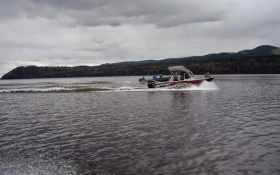Who We Are
The Lake Babine Nation is an Athabaskan speaking nation whose traditional territory surrounds Babine Lake. Our cultural system is centered on the potlatch or balhats,which involves four clans and a series of hereditary leaders serving as the caretakers of the land and providing guidance for the Nation. The Lake Babine Nation has nearly 2400 members who are spread across five communities with and additional three major off reserve communities.
The Lake Babine Treaty Office is a semi-independent body that is responsible for Lake Babine’s effort to negotiate a comprehensive treaty with the BC and Canadian governments. Operating under a separate mandate than the main administration and Chief and Council, the Lake Babine Nation Treaty Office engages in negotiations and pursues independent projects that are related to treaty, including governance, traditional use research, land planning, and community engagement. Treaty is a community driven process, meaning the Treaty Office draws its mandate and takes guidance directly from the community members.
Lake Babine Nation is currently in stage four of the six stage treaty process. At this point the AiP has been largely negotiated at the main table and the different sides need to review the chapters and see where there is a chance that the positions might be able to come closer together on some of the issues. While this is happening, the Treaty Office will be working on some other projects, especially traditional use studies and constitutional development.
Staff
The Lake Babine Nation Treaty Office Staff is available to answer your questions and concerns.
Treaty Society Board
No current society board.
Proposed Statement of Principle
Review the Proposed Statement of Principle regarding our lands, fisheries, self-government and resources.
Vision Statement - Strategic Plan
Review the Lake Babine Nation Treaty Vision Statement.
Partnerships
In January of 2010 a protocol agreement was signed between LBN and UNBC. is agreement involves working together with UNBC to create learning opportunities for both UNBC students and LBN members.





